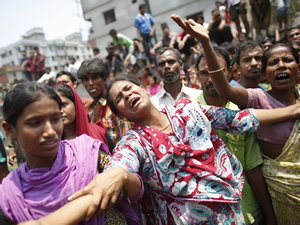Bangladesh garment worker tragedy is ‘mass industrial slaughter’
By TONY BURKE | Published: APRIL 28, 2013
Since 2005, more than 1,000 textile workers in Bangladesh have died in fires and building collapses. Thousands of people, many of them young women work in appalling and unsafe conditions in factories which supply western countries and High Street stores with cheap clothing.
 The collapse of a building housing up to eight factories in Rana Plaza, Dhaka on April 24, with hundreds killed and many workers still missing, is the culmination of neglect, abuse, greed and exploitation by the builders of these sites and the owners of the factories who produce goods for the western market – supplying outlets such as Primark, Matalan and Mango.
The collapse of a building housing up to eight factories in Rana Plaza, Dhaka on April 24, with hundreds killed and many workers still missing, is the culmination of neglect, abuse, greed and exploitation by the builders of these sites and the owners of the factories who produce goods for the western market – supplying outlets such as Primark, Matalan and Mango.
The television coverage of the tragedy has been truly shocking. Media reports have shown the use of child labour, a complete disregard for basic health and safety, lax or non-existant building regulations and a disregard for agreements with customers for basic labour standards.
Even when workers at the Rana Plaza factories in Dhaka complained that the building was cracking open, the owners forced them back to work.The owners of the factories and the builders themselves have now been arrested and the owner of the building Sol Rana has been arrested whilst on the run from the authorities.
Cut price clothing for Western consumers
Rana Plaza is one in a long line of tragedies where workers have lost their lives and their loved ones. Last year over 100 workers were burned to death in a fire at the Tazreen Fashions factory.
And now as the world looks on in horror, the media is asking how this happened. How come High Street stores outlets seem oblivious to what has been plain to see for years? Why do the outlets and fashion chains still do business with these companies? The answer is the seemingly insatiable demand for cheap clothing at cut price rates.
The global manufacturing unions federation, IndustriALL, has been running a campaign to support workers in the Bangladesh textile and garment industry for sometime.
The horror at Rana Plaza has been described by IndustriALL as “mass industrial slaughter”.
And yet, trade union membership in this sector in Bangladesh is low and there are a plethora of unions. Jyrki Raina, the general secretary of IndustriALL, says are as many as 39 national garment workers unions in Bangladesh, (many of them backed by NGOs) who do not always co-operate with each other.
Those workers and unions who have stood up and demonstrated against these outrages have faced attacks by the police and security forces. Union officials and organisers face harassment, violence and death.
Putting pressure on the authorities to act
In 2010 Unite and the United Steelworkers in the USA and Canada, through the global Workers Uniting, supported thousands of garment workers in Bangladesh who went on strike in a fight for a pay increase and decent working conditions and warned authorities to stop the brutal attacks on workers.
The pressure is now on High Street outlets and on the Bangladesh government.
IndustriALL/LabourStart have set up a campaign site to ‘Make garment factories in Bangladesh safe‘ which contains a letter to Bangladesh’s prime minister demanding an end to these outrages.
War On Want has begun a national petition aimed at high street outlets and their supporters have begun demonstrating at Primark stores. The Ethical Trading Inititiatve is also demanding that Primark pay compensation to the families of the victims of those killed and injured at Rana Plaza; and Union Solidarity International has highlighted a number of campaigns including:
- Sign the Change.org petition organised by the National Garment Workers’ Federation in Bangladesh, telling Primark, Matalan and Mango to take responsibility for their supply chains.
- Tell Disney and Walmart to compensate the victims of the Tazreen Fashions fire.
- Demand an investigation into the murder of Bangladeshi union activist Aminul Islam.
As IndustriALL general secretary Jyrki Raina says:
“This terrible tragedy highlights the urgency of putting a stop to the race to the bottom in supplying cheap means of production to international brands, a race in which hundreds of workers have lost their lives. Global clothing brands and retailers have a responsibility for their full production chains. Now it is time for them, suppliers and the Bangladeshi government to sit down with IndustriALL and its affiliates to agree on a safety programme that will ensure this will never happen again.”